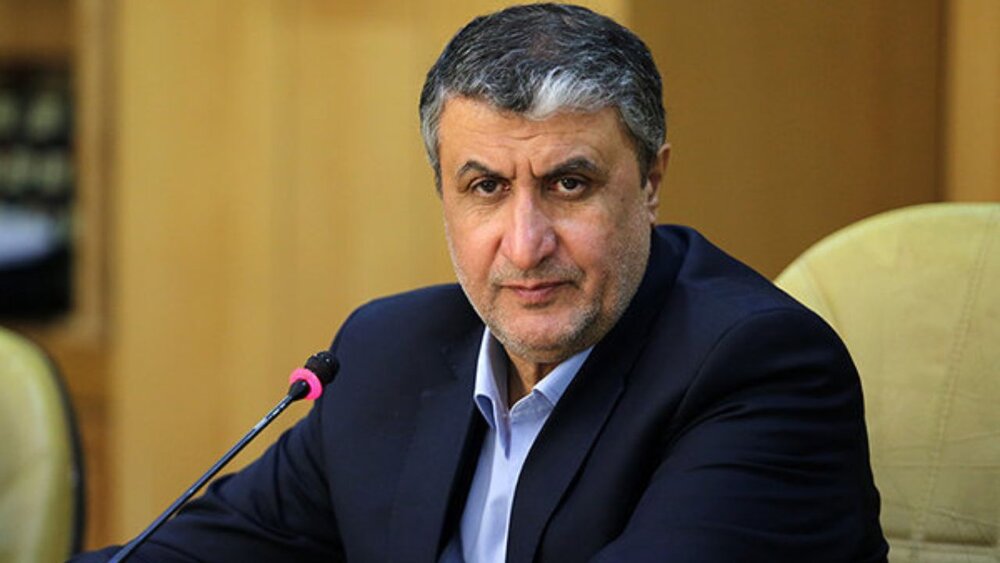Iran seeking to use nuclear technology in agriculture and health

TEHRAN - Head of the Atomic Energy Organization of Iran, Mohammad Eslami, has said that the government will make nuclear technology available to the people, especially in the areas of agriculture, health and the country's economy.
In a statement he made on Friday in the city of Abadan in Khuzestan province, southwest Iran, Islami considered nuclear energy, space technology, nanotechnology and information technology as potential fields, and said, “The state that owns this (nuclear) technology will be a capable state.”
He added, “In the nuclear energy sector, the majority of efforts in the field of enrichment were very valuable, and good progress was achieved.”
He explained that the current government is making every effort to use nuclear technology in the lives of citizens and the country's economy, especially in Khuzestan province, in the agricultural and health sectors, and to play a role in the economy of the country and families, according to Al Alam.
Eslami noted, “The enemy cannot tolerate this technology being made available to other countries, and this is the American national security strategy that seeks to reach its goals through diplomacy and force, but it never reached its goal toward Iran.”
He said, “The enemy tried to end the Iranian nuclear technology, but it failed to reach its goal. Today, the technology of the heavy water project, which was achieved by our scientists, has achieved good successes in effective uses in the field of health and the medical industry.”
The head of the Atomic Energy Organization of Iran expressed regret at the neglect of building nuclear plants in the country in recent years, stressing the need for compensation for that.
He stressed that the Islamic Revolution, despite the unjust embargo imposed on the country over the past five years, is moving forward on a firm and correct path.
Eslami described the recent visit by IAEA Director General Rafael Grossi to Tehran as part of mutual interaction between Iran and the UN nuclear agency.
“We move ahead in accordance with the regulations of professional relations with the International Atomic Energy Agency,” he added, according to Tasnim.
Highlighting the technical and professional cooperation between Iran and the IAEA, Eslami said, “Political influence, contacts and effects cannot divert our relations from the framework of the Agency’s rules and regulations.”
He also underlined that Iran will never allow the enemies to level accusations against Tehran under the influence of the Zionists.
During Grossi’s trip to Tehran on March 5, Iran and the IAEA agreed on a roadmap to resolve all outstanding issues that would help secure the revival of the Joint Comprehensive Plan of Action (JCPOA).
The remarks by Eslami came after the Leader of the Islamic Revolution, Ayatollah Seyed Ali Khamenei, underlined the need to move ahead with nuclear program.
Ayatollah Khamenei stressed that proposals such as abandoning regional involvement in order to avoid giving the enemy an excuse and stopping scientific progress in the nuclear sciences are actually blows to national strength.
“Regional involvement gives us strategic depth and more national strength. Why should we stop this approach? Progress in the nuclear sciences too is related to meeting the needs of the country in the near future. If we abandon these, toward whom should we stretch out our hand in a few years?” he said, according to a readout published by the khamenei.ir.
The Leader made the remarks in a meeting with the members of the Assembly of Experts. In the meeting, he described the intertwined combination of factors involved in national strength and stated that attending to the people’s problems in livelihood is important.
In addressing the requirements of building national strength, the Leader put emphasis on the need to rely on internal resources. “National strength is vital for every country. If any nation wishes to achieve independence and greatness, the ability to use its own vital resources at its own volition and resistance in the face of others’ [illegitimate] demands, it should be strong. Otherwise, if it is weak, humiliated and intimidated, it will always have to worry about the transgressions of foreign powers,” the Leader said.
The remarks came at a time when Iran and world powers are hammering out a deal in Vienna that would put some restrictions on Iran’s nuclear program in exchange for sanctions relief. During the talks, the Western negotiators pushed for broader negotiations to address issues related to Iran’s missile program and its influence in the West Asia region. But Iran roundly rejected widening the scope of negotiations and insisted the talks should be restricted to nuclear issues. The Leader’s remarks were another indication that Iran will by no means negotiate over issues it considers as pillars of its national strength.
Iranian Foreign Minister Hossein Amir Abdollahian and EU foreign policy chief and senior coordinator of the Vienna talks Josep Borrell have held talks over the latest results and the trend of the Vienna talks to remove anti-Iran sanctions as well as some other international issues of mutual interest including the Ukraine crisis.
In the phone call, Borrell said the negotiations are at a critical juncture and now the U.S. and Iran must show more flexibility in their message exchanges and must try to overcome the time limit, according to the Iranian Foreign Ministry.
Borrell said that economic guarantees are important for Iran and the EU supports this, adding, “You and we will continue our efforts to reach a deal because we have come a long way. You Iranians are tough and highly capable negotiators.” The Iranian foreign minister, for his part, thanked the EU foreign policy chief for his efforts and the progress made so far. Amir Abdollahian said, “If all sides behave realistically, we are still close to reaching a good and robust deal.”
The foreign minister of Iran underlined that the making of new demands by the U.S. has no logical justification and this is at odds with the country’s stance on swiftly reaching an agreement.
